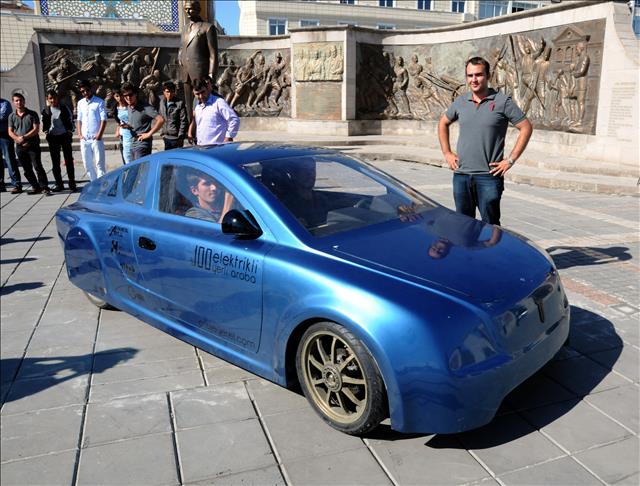Dream of Turkish electric car may soon become reality
Production of a domestic electric car is opportune in energy-hungry Turkey as the country seeks to diminish its fuel costs, narrow its foreign trade deficit and reduce carbon emissions for a cleaner environment

By Furkan Naci Top
ISTANBUL
Turkey attempted to produce its first domestic car in 1961, called the "Devrim" (Revolution).
It was not a success.
The production of Devrim cars was halted after the first four prototypes. Since then, Turkey has not made any significant attempt at reestablishing a Turkish automobile brand… until now.
Today, the country eyes the electric car. Production of such a vehicle would indeed appear opportune in energy-hungry Turkey as the country seeks to diminish its fuel costs, narrow its foreign trade deficit and reduce carbon emissions for a cleaner environment.
Last October, the industry and technology minister, Fikri Isik, pointed to electric automobile technology as a "new window of opportunity" since Turkey had "missed the train" of combustion motorized cars.
Isik has set 2020 as the year for the advent of a ready-to-market electric car.
The Turkish foreign trade deficit has proved one of the weaker aspects of the Turkish economy namely because the country is so energy dependent. Indeed, over 60 percent of the total foreign deficit in 2013 was due to net energy imports.
With a domestic electric car, Turkish economy professor, Ersan Oz, estimates that Turkey can reduce its current account deficit by $20 billion, especially if the automobile is exported.
In 2014, the current account deficit is expected to stand at around $46 billion.
"Producing a domestic car will decrease our imports, restrain the outflow of foreign currency and also increase [its] inflow as we export our brand," said Oz, from Pamukkale University in western Turkey.
According to U.S.-based Alternative Fuels Data Center, all-electric cars will cut energy costs to almost a quarter and greenhouse gas emissions by one third, compared with traditional fuel-based vehicles.
Turkey already has the capacity to produce cars that can travel 450 km with an hour and a half’s charging, said Onder Yol, partner at Derindere Motors (DMA) and the brain behind Turkey's most advanced electric car.
A Tesla S model, an efficient luxury electric car from Tesla Motors, co-founded by the Steve-Jobs-esque entrepreneur Elon Musk, can travel 426 km with roughly the same charging time.
Onder Yol said that his company has the capacity to produce a car that is more than 90% locally made.
"We can produce all components of the car in the Turkish sub-industry except for five," said the mechanical engineer, who returned to Turkey from the U.S. almost 10 years ago to realize his dream of making the first Turkish electric car.
The charging station in his model is embedded inside the electric car. As a result, the driver can charge his automobile anywhere thanks to a simple plug.
“Therefore, there is no need for a huge transformation in infrastructure,” said Cengiz Arslan, the head of the automotive commission in the Independent Industrialists and Businessmen Association (MUSIAD).
At most, he advances the need for additional plugs in parking lots.
However, according to Arslan, without tax incentives, the electric car will not have a chance to see the light of day in Turkey.
"Consumers should be assured not to pay [consumer] taxes for a period of time of at least 5-10 years," he said.
Economy professor Ersan Oz, who works closely with MUSIAD, estimates at $2.2 billion the investment needed for a production capacity of 150,000, including marketing.
Oz claims that if the production figures reach 20,000, the price of the car will be $28,000.
A DMA-Toyota joint-production electric car has already hit the road, but with a $75,000 price tag.
A considerable obstacle remains in the way of the first Turkish domestic car: the lack of a true test center on Turkish soil to grant approval for vehicles. This engenders huge costs for the Turkish automotive industry, Arslan claims.
To answer the industry’s preoccupations, Turkey is currently building a new test center in the western city of Bursa, the industry minister announced last month.
On Turkey’s Republic Day, in 1961, the Turkish president at the time took the domestically-produced "Devrim" out for a spin for the entire nation to see. However, it stopped after several meters. No one had thought to put fuel in the vehicle.
A national embarrassment that killed all ambitions for the car.
A blow that a Turkish electric car will assuredly never know.
Anadolu Agency website contains only a portion of the news stories offered to subscribers in the AA News Broadcasting System (HAS), and in summarized form. Please contact us for subscription options.

